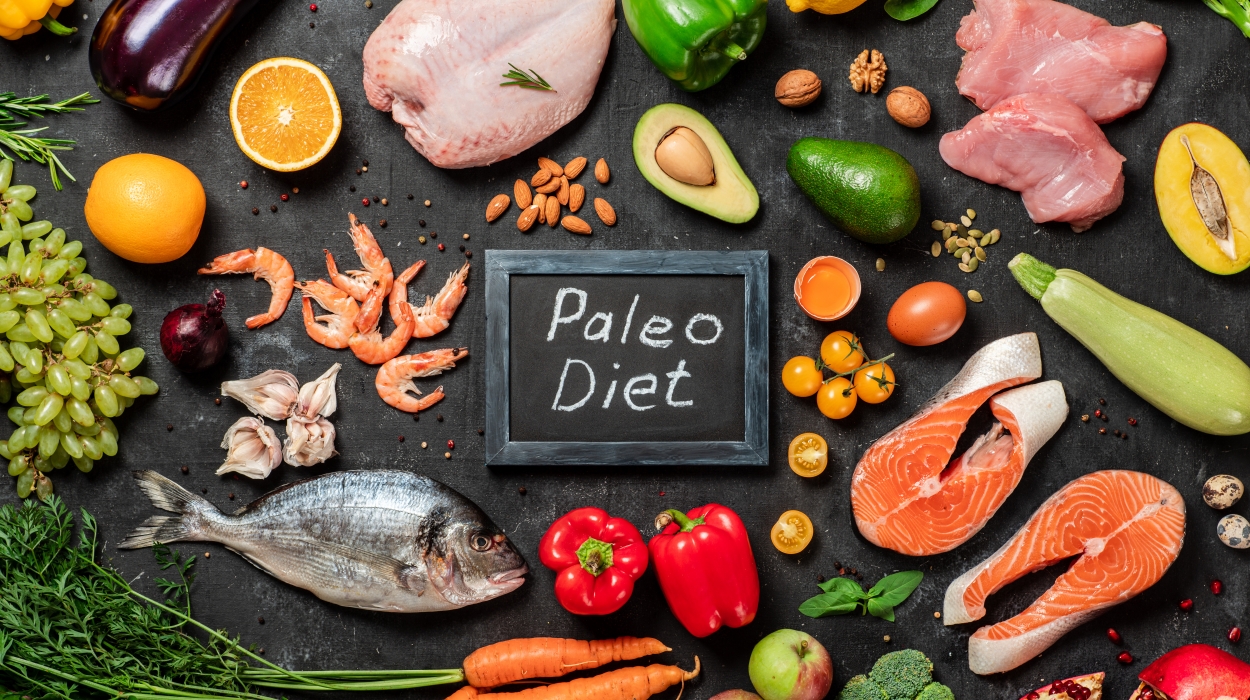 Expert's opinion
Expert's opinion
Expert's opinion
The article is a subjective view on this topic written by writers specializing in medical writing.
It may reflect on a personal journey surrounding struggles with an illness or medical condition, involve product comparisons, diet considerations, or other health-related opinions.
Although the view is entirely that of the writer, it is based on academic experiences and scientific research they have conducted; it is fact-checked by a team of degreed medical experts, and validated by sources attached to the article.
The numbers in parenthesis (1,2,3) will take you to clickable links to related scientific papers.
Mediterranean Diet Vs. Paleo Diet: Which’s The Best Choice In 2024?

Nowadays, some people think about which diet plan might be better and compare diets such as the Mediterranean diet and the Paleo diet.
Each diet can benefit its consumers; however, knowing what foods make up these regimens and how they impact health is important.
The goal of this article is for people can know the differences between the Mediterranean diet and the Paleo diet and know which one could be their best option.
The Difference Between Paleo And Mediterranean Diet
One of the main differences between the Mediterranean and Paleo diets is the types of foods that can be consumed. Both diets contain foods with high nutritional value, but the Mediterranean diet is more flexible than the paleo diet. The Mediterranean diet does not restrict the consumption of foods such as grains and dairy products; it only specifies moderate consumption, while the paleo diet is usually stricter and does not include the consumption of these foods.
Mediterranean Diet Vs. Paleo Diet: What Are The Differences?
Although various meal plans contain similar foods, this does not mean they are the same and will impact people equally. Knowing the differences between the various existing patterns will help you choose the most convenient and appropriate one.
Even if the Mediterranean and the paleo diet are made up of similar foods, some differences will help you make more informed choices. The most common differences are:
- The paleo diet restricts cereals and legumes, while these foods are present in the Mediterranean diet.
- The Mediterranean diet encourages consuming whole grains, such as bread, while in the paleo diet, it is not consumed.
- In the Mediterranean diet, red meat consumption is reduced, while in the paleo diet, this is one of the main protein sources.
- In the paleo diet, alcohol consumption is not included, while in the Mediterranean diet, wine consumption is moderate.
- Those who follow a Mediterranean diet gain more nutrients than those who follow the paleo diet since the former contains more groups of foods with greater nutritional value.
- The Mediterranean diet encourages minimally processed foods, while the paleo diet has no processed foods.
The differences between the Mediterranean diet and the Paleo diet are listed, so you can choose the best one to suit your needs.
Similarities Between Mediterranean And Paleo Diets
Today, the wide variety of diets can confuse those interested. Some diets have similar food components, allowing people to choose without complications. The Mediterranean and paleo diets have similarities that many should be aware of.
The most common similarities between the Mediterranean diet and paleo diet are:
- Paleo and Mediterranean diets contain high-protein foods such as fish, eggs, and meats.
- Both diets eliminate processed foods in their dietary patterns.
- Mediterranean and paleo diets contain fresh, whole foods that benefit consumers’ health.
- Both diets discourage or avoid chemical food additives.
What Is The Mediterranean Diet?

The Mediterranean diet is a term used to describe the eating habits of the countries that surround the Mediterranean Sea. It is an eating style made up of a group of foods with great health benefits.
The foods included in the Mediterranean diet are varied. Healthy fats and plant-based foods, such as fruits, vegetables, nuts, whole grains, and fatty fish, make up these foods. Olive oil is the main source of fat for cooking.
The consumption of sausages, red meats, and sweets is minimal due to their adverse effects on health. As for drinks, besides water, there is also a moderate consumption of red wine.
There is also the green Mediterranean diet. This Mediterranean diet has a lower consumption of meat than the regular Mediterranean diet and a higher consumption of vegetable matter, with large amounts of green tea consumption.
Vegetables, legumes, and whole grains are accompanied by other foods of the traditional Mediterranean diet, such as fish, fruits, and nuts. This green Mediterranean diet also includes a large amount of green tea. People consider it healthier than the traditional Mediterranean diet because of the anti-inflammatory components of the large amounts of green tea consumed with vegetables.
How The Mediterranean Diet Affects Health
You will enjoy its many benefits if you consume foods that comprise the Mediterranean diet. Various studies show that the Mediterranean diet affects people’s health in the following ways.
- Decreases the risk of developing cardiovascular disease.
- Protects against oxidative stress.[1]
- Helps in the prevention of type 2 diabetes.[2]
- Helps reduce the risks pregnant women may experience during this period, such as premature birth and tissue damage during labor. It also provides the baby with the nutrients to be born healthy.
- Helps people not become overweight or obese.[3]
- Reduces the risk of cognitive decline and dementia.
Disadvantages Of The Mediterranean Diet
Although the advantage of the Mediterranean diet is that it has multiple reported health benefits for those who consume it, as discussed above, the Mediterranean diet has some disadvantages.
One downside to this eating pattern is the cost. Plant foods are often more expensive[4] than processed foods. And, some people need access to all the foods in the Mediterranean diet, so processed foods are the choice of many.
Another disadvantage of the Mediterranean diet is that it is not for everyone. You may have intolerances and stomach problems if you avoid certain foods from this type of eating pattern, such as fiber, fermentable carbohydrates, and dairy.
Those who eat a Mediterranean diet will also be exposed to more insecticides. One study highlighted that Western and Mediterranean diets contain various insecticides that can affect people’s health, but insecticide levels were higher in those consuming Mediterranean diets.
What Is The Paleo Diet?

The paleo diet, often called the caveman diet, was followed by our Paleolithic ancestors. The eating patterns of this diet are composed of fruits, vegetables, fish, lean meats, nuts, seeds, and eggs. The paleo diet avoids ultra-processed foods, dairy products, alcohol, and refined sugars. It also does not include the consumption of cereals and legumes.
Consumers of the paleo diet can enjoy many health benefits. According to research, the paleo diet impacts the health of its consumers in several ways:
- Weight loss: The paleo diet can help people lose weight[5] and avoid obesity because it does not include ultra-processed foods and sugar.
- Stable blood sugar values: Studies indicate that the paleo diet can help keep blood sugar levels stable and prevent developing type 2 diabetes due to the foods that comprise it.
- Reduces the risks of cardiovascular disease: It has been found that those who eat a paleo diet can have cardiovascular benefits. Avoiding ultra-processed foods and a high intake of fruits, vegetables, fish, and nuts help to lower blood pressure, promoting good cardiovascular health.
- Lowers cholesterol levels: It has been found that the paleo diet can help lower cholesterol levels because it avoids the consumption of various foods containing saturated fats such as dairy, fried, and processed foods.
The paleo diet has several health benefits, but at the same time, it has some disadvantages that people should be aware of. One disadvantage of the paleo diet is the limited amount of food. This dietary pattern is likely to be maintained in the short term, but it may be more difficult to follow in the long term.
Another disadvantage of the paleo diet is that it omits the consumption of certain foods that influence health. One example is grains, which contain fiber. Fiber helps maintain intestinal health, maintain normal blood sugar levels, and reduce cholesterol levels.
Mediterranean Diet Vs. Paleo Diet: Which Is The Best Diet For You?
The best diet for you is the one that fits your needs and your health goals. When trying new eating patterns, it is important to analyze the reasons and their impact on your health. You can find more details on the Mediterranean diet by visiting the Mediterranean Diet Pyramid.
Your doctor or registered dietitian may do various assessments to help you decide what foods to eat to balance your metabolism. The goal of diets is for them to impact your life positively, so deciding to go on a diet should not be taken lightly.
If you eat a Western diet and want to enjoy greater benefits for your health, the Mediterranean diet may be a good option. If you want to lose weight, the Paleo diet may be what you need. In conjunction with diet, some people use fat burners for better results.
Remember that choosing a diet is not simply choosing a pattern of established foods; it is a change in your lifestyle. There will be times when you probably want to give up and return to your old eating habits, but remember that to see its benefits, maintain those eating patterns for the long term. If planning your meals is a chore, you can always schedule a meal delivery service to assist you.
Conclusion
Paleo and Mediterranean diets have different purposes but have something in common. These diets help people get the nutrients they need and have good health. Each eating pattern has specific foods; people should analyze their needs and see which will work best for them.
Suppose you are interested in changing your eating pattern, leaving behind some processed foods, and starting with some of these diets. In that case, you should seek advice from a medical professional such as a registered dietitian, and choose the most convenient option for your lifestyle. Each diet has foods with high nutritional value, such as eggs, fish, nuts, and healthy fats, such as olive oil and coconut oil.
Having a good diet is essential for human beings. An eating pattern with high nutritional value can help your body function better, have more energy during the day, and avoid diseases.
+ 5 sources
Health Canal avoids using tertiary references. We have strict sourcing guidelines and rely on peer-reviewed studies, academic researches from medical associations and institutions. To ensure the accuracy of articles in Health Canal, you can read more about the editorial process here
- Tosti, V., Bertozzi, B. and Fontana, L. (2017). Health Benefits of the Mediterranean Diet: Metabolic and Molecular Mechanisms. [online] 73(3), pp.318–326. doi:https://doi.org/10.1093/gerona/glx227.
- Martín-Peláez, S., Montserrat Fitó and Castañer, O. (2020). Mediterranean Diet Effects on Type 2 Diabetes Prevention, Disease Progression, and Related Mechanisms. A Review. [online] 12(8), pp.2236–2236. doi:https://doi.org/10.3390/nu12082236.
- Muscogiuri, G., Verde, L., Cem Sulu, Katsiki, N., Hassapidou, M., Frias-Toral, E., Cucalón, G., Agnieszka Pazderska, Volkan Demirhan Yumuk, Colao, A. and Barrea, L. (2022). Mediterranean Diet and Obesity-related Disorders: What is the Evidence? [online] 11(4), pp.287–304. doi:https://doi.org/10.1007/s13679-022-00481-1.
- Hardman, R.J., Kennedy, G., Macpherson, H., Scholey, A. and Pipingas, A. (2016). Adherence to a Mediterranean-Style Diet and Effects on Cognition in Adults: A Qualitative Evaluation and Systematic Review of Longitudinal and Prospective Trials. [online] 3. doi:https://doi.org/10.3389/fnut.2016.00022.
- Almeida, V., Alves, H., Augusto, A., Nara, Filipe Tamburini Brito, Magalhães, M., Paula, A. and Pinheiro, S. (2019). Influence of Paleolithic diet on anthropometric markers in chronic diseases: systematic review and meta-analysis. [online] 18(1). doi:https://doi.org/10.1186/s12937-019-0457-z.



